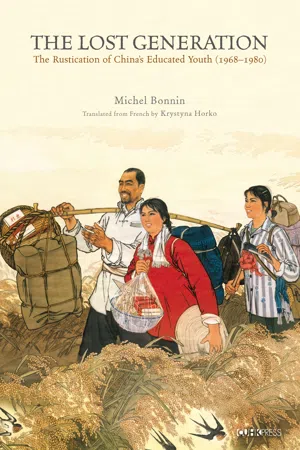
The Lost Generation
The Rustication of China's Educated Youth (1968–1980)
- English
- PDF
- Available on iOS & Android
The Lost Generation
The Rustication of China's Educated Youth (1968–1980)
About this book
The Lost Generation is a vital component to understanding Maoism. The book provides a comprehensive account of the critical movement during which seventeen million young "educated" city-dwellers were supposed to transform themselves into peasants, potentially for life. Bonnin closely examines the Chinese leadership's motivations and the methods that they used over time to implement their objectives, as well as the day-to-day lives of those young people in the countryside, their difficulties, their doubts, their resistance and, ultimately, their revolt. The author draws on a rich and diverse array of sources, concluding with a comprehensive assessment of the movement that shaped an entire generation, including a majority of today's cultural, economic, and political elite.*Chosen as one of the "Choice Outstanding Academic Title, 2014"
Frequently asked questions
- Essential is ideal for learners and professionals who enjoy exploring a wide range of subjects. Access the Essential Library with 800,000+ trusted titles and best-sellers across business, personal growth, and the humanities. Includes unlimited reading time and Standard Read Aloud voice.
- Complete: Perfect for advanced learners and researchers needing full, unrestricted access. Unlock 1.4M+ books across hundreds of subjects, including academic and specialized titles. The Complete Plan also includes advanced features like Premium Read Aloud and Research Assistant.
Please note we cannot support devices running on iOS 13 and Android 7 or earlier. Learn more about using the app.
Information
Table of contents
- Half Title Page
- Map
- Title Page
- Copyright
- Frontispiece
- Contents
- Preface
- Introduction
- Part 1. Motivations
- 1. Ideological Motives
- 2. Political Motivations
- 3. Socioeconomic Motives
- Part 2. The Life and Death of the Xiaxiang Movement: Policy Changes
- 4. The Managers and the Ideologue: The Prelude and Interlude of the Cultural Revolution (1955–1966)
- 5. The Mass Movement (1968–1976)
- 6. Irresistible Agony (1977–1980)
- 7. The Shadow of Xiaxiang in the 1980s
- Part 3. Firsthand Experience
- 8. The Conditions of Departure: “Voluntary” Deportation
- 9. Material Difficulties and Low Morale
- Part 4. Social Resistance
- 10. The Social Control System
- 11. Passive Resistance and Its Effects
- 12. Open Resistance
- Part 5. Assessment of the Xiaxiang “Movement” in History
- 13. Socioeconomic Assessment
- 14. Political and Ideological Assessment
- Conclusion
- Glossary
- Bibliography
- Index of Places
- Index of Persons
- Thematic Index